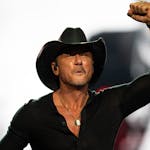Elton John is saying goodbye to the road. As he heads to Target Center this week on his Farewell Yellow Brick Road Tour, we can agree that he's had a marvelous career. But let's be honest, it's had highs and lows. The hyper-prolific piano man has released more than 130 singles, some good, some bad — and some so eccentric they're quintessential Elton. (And yes, I know he doesn't write the lyrics, but he does sing them.)
The good
"Your Song" (1970): Our introduction to him: Sweet. Simple. Direct. A perfect valentine.
"Take Me to the Pilot" (1970): With its earthy soulfulness, violin filigree and na-na-na choruses, this B-side to "Your Song" comes off like a British piano man's homage to Ray Charles.
"Country Comfort" (1970): Nashville filtered through London. This straightforward country-gospel ballad, written with lyricist Bernie Taupin, is filled with vivid details about small-town life and pedal steel guitar.
"Burn Down the Mission" (1971): He's tried so many styles, so why not gospel, delivered with fervent vocals and churchy piano.
"Tiny Dancer" (1972): With its pretty piano melody and unconventional chorus, this graceful character portrait is elusive and irresistible.
"Rocket Man" (1972): This pop explosion could stand as Elton's signature song, delivering a rich piano melody, alternately soft and majestic passages, passionate vocals and lyrics about being in his own orbit.
"Mona Lisas and Mad Hatters" (1972): Elton at his most artful — a spare piano-and-mandolin ballad that's an eloquent, insightful meditation on New York City, where people go to find their true selves.
"Saturday Night's Alright (for Fighting)" (1973): Elton satisfies his Stones jones in this full-tilt rocker with guitars a-blazing.
"Bennie and the Jets" (1974): With stuttering vocals and hesitant piano, he offers a smart sendup of music-biz hype. Believe the song, not the hype.
"Philadelphia Freedom" (1975): Written as an anthem for Billie Jean King and her pro tennis team, this is a rollicking, post-hippie ode to being on your own and being free.
The bad
"Lucy in the Sky With Diamonds" (1974): Even with EJ's rose-colored glasses, this remake is a bad trip.
"Island Girl" (1975): A racist, paternalistic reflection about a hooker, set to a hopelessly peppy tune.
"Someone Saved My Life Tonight" (1975): His savior is sugar bear. Who? What? With its cascading harmonies and pointless piano bridge, this overwrought ballad sounds like a blueprint for Freddie Mercury and Queen.
"Sorry Seems to Be the Hardest Word" (1976): Never has a minor-key pseudo-classical piece with major Brian Wilson-esque ambitions sounded so inconsequential.
"I Guess That's Why They Call It the Blues" (1983): It's not the blues. It's a piano pop ditty with a nursery-rhyme lilt about someone who is a little blue. Stevie Wonder's contribution may be the least bluesy harmonica solo ever.
"Who Wears These Shoes" (1984): This syncopated funk-lite piffle either questions EJ's sanity or his successors. Either way, it would be better to buy new shoes.
"Nikita" (1985): Musically, this song lulls you to sleep as the singer moons over a female East German border guard with a Russian name.
"Club at the End of the Street" (1990): If this brisk but bland song is somebody's idea of club music, dancers should stay away.
"Can You Feel the Love Tonight" (1994): No. Trite, dispassionate and sooo Disney.
"This Train Don't Stop There Anymore" (2002): A piano ballad with the pace and gravitas of an orchestrated standard, this late-period autobiography uses railroad imagery for someone who was once the main express but is no longer full-speed ahead.
The 'Oh, Elton'
"Crocodile Rock" (1972): Great piano rock 'n' roll nonsense in the spirit of Little Richard's "Tutti Frutti."
"Goodbye Yellow Brick Road" (1973): EJ channels John Lennon vocally and Paul McCartney musically with a grandiose piano arrangement.
"Funeral for a Friend/Love Lies Bleeding" (1973): Call it an 11-minute mini-opus or mock opera. After a grand instrumental introduction, Elton cranks the guitars to 10 for a bracing rocker — with a dialed-down instrumental break — as he sings about a musician's heartbreak.
"Don't Let the Sun Go Down on Me" (1974): Soft and simple, orchestral and bombastic, majestic and emotional, it's Elton in a nutshell.
"Candle in the Wind" (1974): This piano paean to Marilyn Monroe and dying too young later took on a different meaning as an elegy to Princess Diana.
"The Bitch Is Back" (1974): Ebullient, sassy and (yes) bitchy, this proves EJ can rock out to guitars and horns.
"Don't Go Breaking My Heart" (1976): In the Motown tradition of Marvin Gaye and Kim Weston, Elton goes all in on this pop-soul duet with Kiki Dee, complete with string-heavy orchestral bridge.
"Empty Garden (Hey Hey Johnny)" (1982): A sad, sincere salute to John Lennon, complete with Beatles-y harmonies and harpsichord textures. The title probably refers to Madison Square Garden, where he performed with Lennon.
"Blue Eyes" (1982): It's about his lover's eyes, but the inspiration is clearly Ol' Blue Eyes, Frank Sinatra, especially with Sir Elton's careful, crooner-worthy phrasing.
"Sad Songs (Say So Much)" (1984): This could have been a great honky-tonk tonic, but our hero, who knows no overkill, overdresses it with instrumental brightness and a Phil Spector backup choir to make it quintessential Elton.





